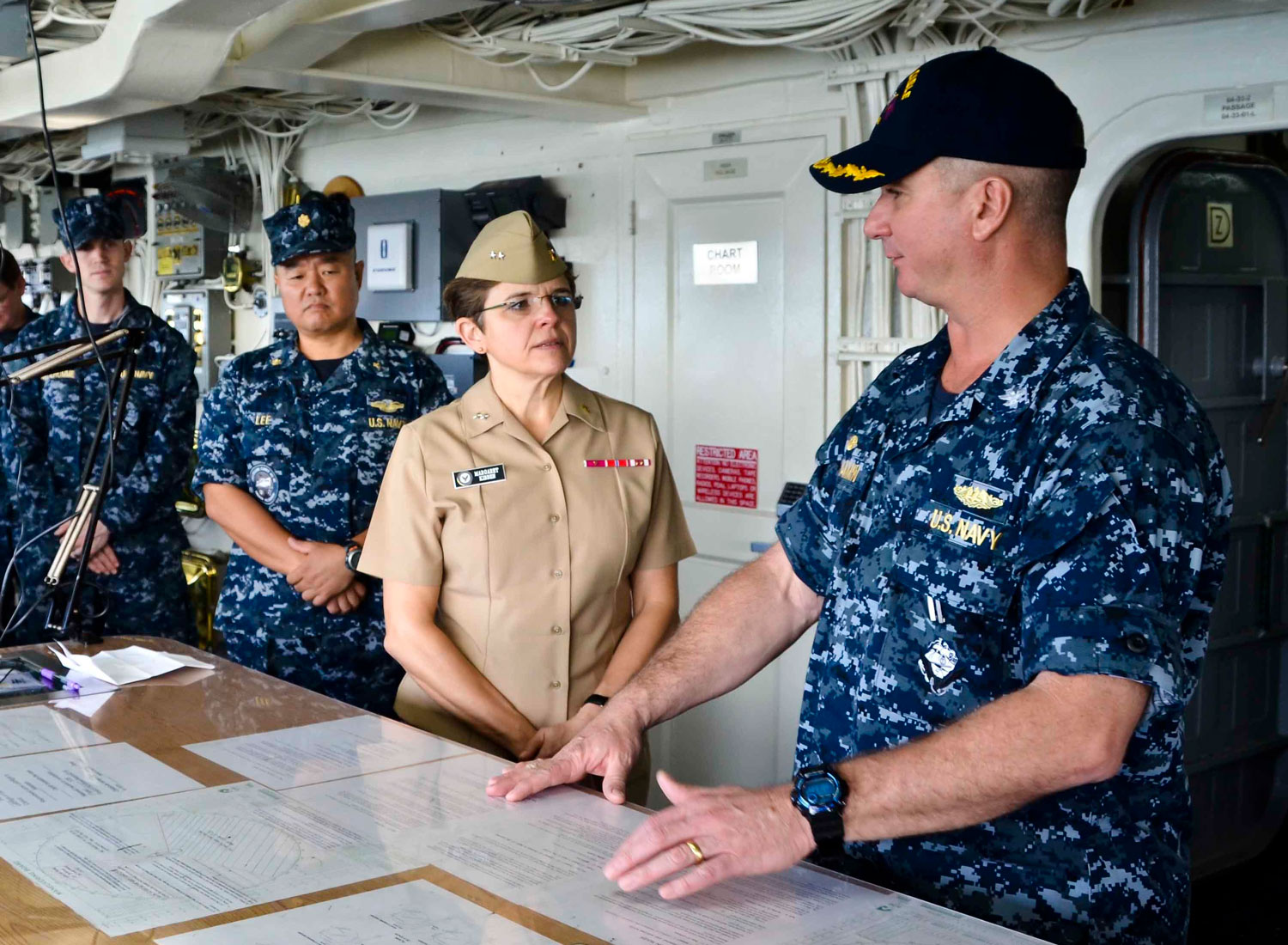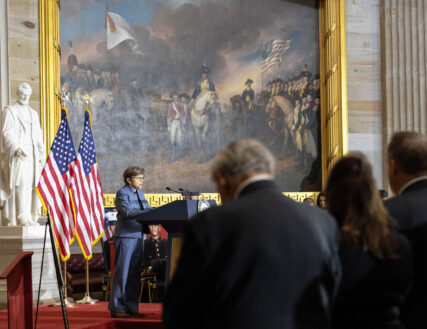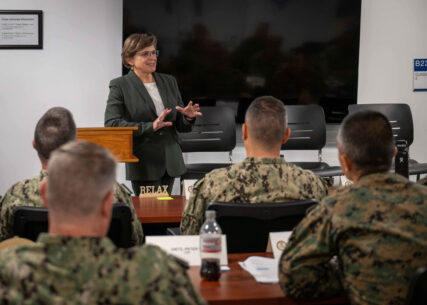
(RNS) — Chaplain Margaret Kibben, now acting chaplain of the House of Representatives, has spent much of her long career as a U.S. Navy chaplain in camouflage. Often it has been the sailors and Marines she has ministered to who haven’t always known how to decipher exactly who they are meeting.
In a recent interview, Kibben recalled a day in the late 1990s at Camp LeJeune, in North Carolina, when she overheard a Marine ask a comrade, “Who the — was that?” Later in the day, after learning that Kibben was a chaplain, he asked, “Hey chaplain, got a minute?” It led to a chance for them to speak privately about his personal challenges.
“For me, that is quintessential chaplaincy,” said the Presbyterian Church (USA) minister and former chief of chaplains of the Navy, the 26th person and the first woman to fill the role. “You are where it matters, when it matters, with what matters. And sometimes the ‘when’ goes over a whole day, sometimes the ‘where’ takes you on a hike and into a camp post, but wherever or whenever you are, you’re there with what matters, and that’s an ear and a safe place and an opportunity to let that person be who they are and to be received with love and grace and mercy in those moments.”
RELATED: US military chaplaincy marks 250 years of providing spiritual support to service members
Kibben, who was made acting House chaplain in January after serving in the post since 2021, spoke with Religion News Service for the 250th anniversary of military chaplaincy. The interview was edited for length and clarity.
When you consider the 250th anniversary of military chaplaincy in the U.S., how would you sum up its significance?
The idea to have a military chaplaincy, for one, is just indicative of how important that sort of ministry is, and the importance that the country has placed on that ministry. For it to have lasted 250 years and all the changes that have taken place emphasizes how valuable that opportunity is for sailors, soldiers, airmen, Marines, Coast Guardsmen, Guardians, to have that presence with them where they are.
How does military chaplaincy differ from other chaplaincies?
Particularly with military chaplaincy, so much is on the line. We bring men and women from their hometowns and ask them to defend our country in places far and wide, but we don’t ask them to leave their faith at home. They do leave their churches, synagogues, mosques, temples, but when they go underway, we actually, as a country, want them to hold onto those values, to hold onto the things that make them good, moral, responsible human beings, especially in the fight, especially when things are challenging.
And military chaplaincy is incorporated into those commands, into those units, into those services. It’s part of the fabric of military service that there will be somebody to remind the command and the individuals thereof of the importance of the whole person, not just the fighting man or woman, not just the thinking man or woman or flying or ship driving or shooting, but the whole person and not just a machine to be used in the case of warfare. Chaplains are there to bring that humanity to the fore.

The Reverend Margaret Grun Kibben, chaplain of the United States House of Representatives, gives the benediction at a Congressional Medal of Honor Ceremony in honor of the 13 service members who lost their lives on August 26, 2021, while stationed at Hamid Karzai International Airport in Kabul, Afghanistan. U.S. Army photo by Staff Sgt. Brittany Primavera.
In both the House and in war there are ethical questions, but how are the questions and quandaries different?
It’s the immediacy of those ethical decisions, the immediacy and the isolation that military members feel. The 435 members of my congregation represent the same demographics as military service. But as they come together here in the House, they don’t have the same immediacy that a service member is facing on the front line. There are front lines certainly here, and they are worthy of discussion, but they do not have the same life or death, immediate presence of the decision-making that one has to train for to pull the trigger on a weapon.
The other thing that’s different is that when men and women join military service, there’s a unity of effort. They join together to defend the country, and the mission is generally clear and generally understood as a common goal. That is not true here. (Laughs.) There is not as often unity of effort. There is not a common sense of a common goal. And so the disparate nature of the congregation here is part of the challenge.
What was it like to be the first woman chief of chaplains for the Navy? Were there changes you made that you thought were important, for the chaplaincy or the wider military?
I struggle with those first-woman questions a lot, because I actually think they do a disservice both to men and to women. I think we each bring our unique gifts and graces into the environment in which we serve. And one of those gifts and graces may be our gender, but it may not be, or it may not be the way we think it is.
As a young chaplain, there were often times I was told I should be with this unit or this battalion or this command because there are more women there. OK, I get that, except that you’ve just said that the men can’t take care of women service members, and that’s not fair either. The other part of it is that a lot of men would come to me because I was a woman, and therefore they didn’t have to prove anything. There was no machismo filter there.
I know I brought certain gifts to the role as chief of chaplains, and I know that some of that includes my gender, but some of it also just includes my experiences and my backgrounds and my faith tradition and a whole host of other things.
Chaplains are known for the ability to attend to people of different faiths. In recent decades, there have been debates about the role of evangelism and proselytism in the military. How did you see chaplains deal with that divide?

NEWPORT, R.I. – House of Representatives Chaplain retired Rear Adm. Margaret Kibben, who served as the Navy’s 26th chief of chaplains, speaks to the Naval Chaplaincy School (NCS) Senior Leadership Course (SLC) at Naval Station Newport, Rhode Island, Nov. 21, 2024. (U.S. Navy photo by Brett Dodge)
As a chaplain, the reason we exist is to facilitate individuals in their own free expression of religion. It is not about the chaplain. It’s about the individual. As a chaplain, I have to care for all. If, as a facilitator, my motivation is to evangelize you, then I can’t be a very good facilitator, and it looks more like I’m sheep-stealing than, in fact, sheep guiding or sheep facilitating.
I can talk salvation till the cows come home in my chapel service, because everybody has willingly agreed to come to my chapel service, knowing that I come from that faith tradition. I’m not imposing my faith on anyone, but I’m bringing people along. It also doesn’t preclude me from having a conversation with an individual on life matters, not religious matters or spiritual matters in any way. But we will talk all the way around problem solving and solutions and opportunities and we’re still at a standstill. For me to be able to then turn to that individual and say, “Listen, you came to me as a chaplain, and you see this big honking cross I have on my collar on my uniform. If you’d like, I will share that with you as a possibility, as an answer that might be available to you.”
Is that evangelism in a way? Yes, of course it is, but it’s still the person’s choice. I ask the person, “Do you want to hear that?” Not: “Have I got an answer for you.” But you leave the door open to evangelize, to bring people into another understanding of faith.
How is evangelism different from proselytism?
Proselytizing is “I’m here to save you, and I’m not here to listen to your questions and help you solve your problems, help you on your faith journey. I’m here to give you the ticket to this journey.” Can’t do that.
RELATED: Speaker Mike Johnson pushing to replace House chaplain
